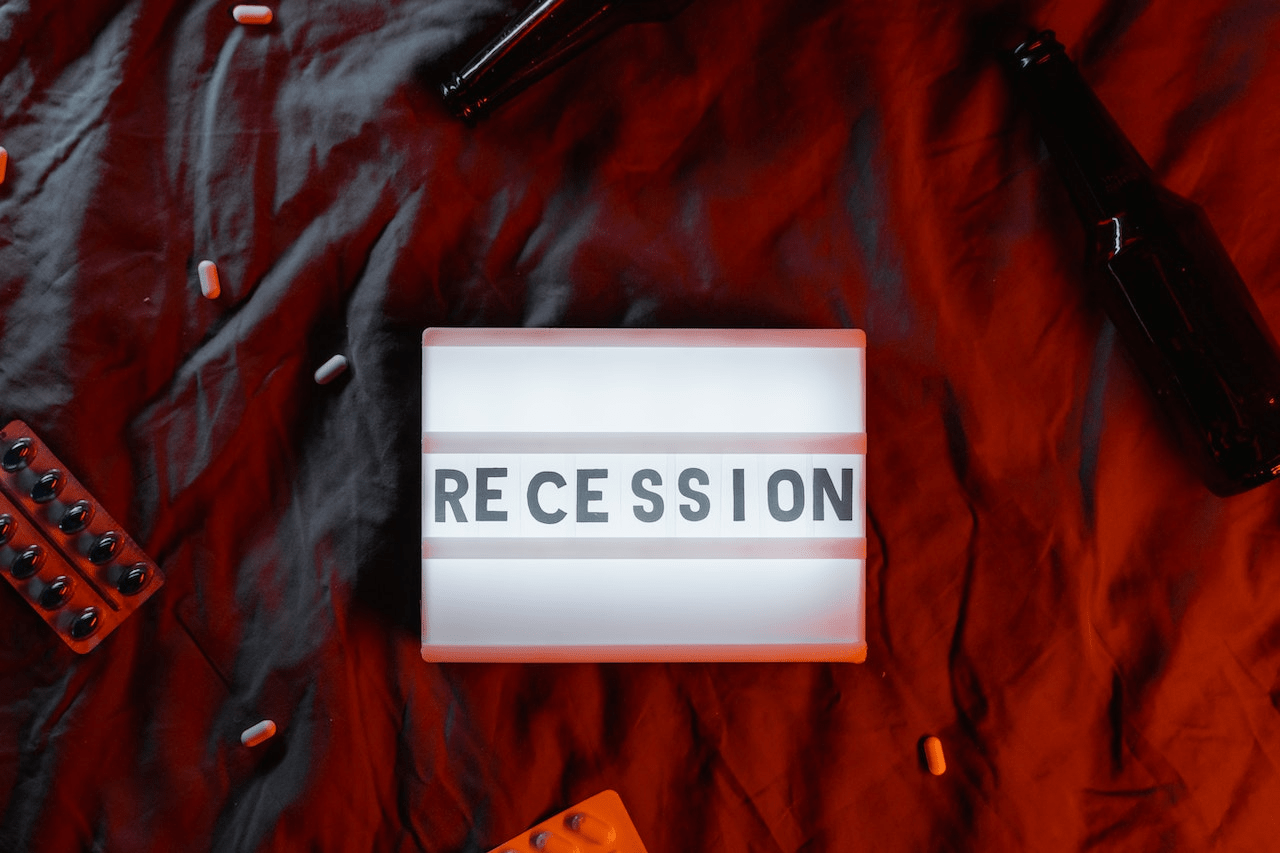What does a recession mean for me? There's been talk of a looming recession for a while now. And this is possible given the country's current state of the economy.
But what does a recession mean to the vast population? How will an economic downturn impact your life? And what can you do to make the experience less traumatic?
These are crucial questions to ask, and the answers can help you survive when a recession hits. So, let's get answers to these pressing questions about a recession. You can also go through our guide on how to prepare for a recession if you want more details.
Table of Contents
What Does a Recession Mean for the Average Person?

When there are signs of an economic downturn, the next step might be to announce a recession. This happens after experts do thorough economic research and note growth in negative GDP. Often negative GDP goes hand in hand with high inflation leading to tough economic times.
At the moment, there hasn't been an official announcement of a recession. But there's talk of one imminent and an appeal for folks to prepare. If there's a high possibility of a recession, it's essential to know what this means for you.
So, what does a recession mean for me?
1. High-Interest Rates
During a recession, tough times will be the order of the day. And it's good to be careful during an economic downturn regarding debt. For instance, most financial institutions often charge higher interest rates, something you should note when you want to borrow money.
If you have debt, it's essential to keep making payments. This can include a personal loan or credit card debt used to cover your living expenses.
Also, avoid acquiring new credit cards because they come with higher interest rates. So, while it is sometimes hard, avoiding high-interest debt is crucial.
See Related: The 11-Word Phrase to Stop Debt Collectors
2. A Rise in Unemployment

Many industries take a hit during tough economic times. As a result, there is an increase in unemployment, according to labor statistics. Basically, the labor market is one of the hardest hit when a recession hits.
If you lose your job, you must find another way to cover your living expenses. This can mean tapping into an emergency fund and reducing consumer spending. Avoid situations where you have to borrow money when there's an impending recession.
You can also try alternatives, such as making money online or finding a recession-proof job. This ensures that you don't go down with the economy.
See Related: Best Recession-Proof Businesses
3. Rise in Inflation
Things tend to cost more when there's an impending recession. You have to pay more, even for food and non-food items. If you have a recession-proof career, you might not feel the full effect of high inflation. But if you don't, the decrease in income and the rising cost of products and services will undoubtedly affect you.
The prudent thing here is to find ways to spend less during economic downturns. Cutting on consumer spending might not be comfortable, but it can mean having more money in your pockets.
See Related: Best Food Affiliate Programs
Who Benefits from a Recession?
The best way to note who benefits from a recession is to look at recession-proof industries. These remain primarily unaffected during economic downturns. Folks with recession-proof careers don't find themselves looking for work during a recession.
There are several examples of recession-proof industries in the US. These include:
- Government
- Healthcare
- Accounting and Finance
- Grocery Stores
- Public Transport
These industries are a necessity to a vast majority of the population. For example, even during a significant decline, you must go to the hospital if you fall sick. Healthcare services are essential and tend to continue even when there's hostile economic activity.
Therefore, those who benefit the most are folks with recession-proof careers and businesses, like government workers, doctors, nurses, grocery store attendants, and accountants. If you want to change careers, consider these industries and the available employment opportunities.
Another group of people who can benefit during a recession is investors. If you are a real estate investor, a time of economic decline can offer new opportunities. Since many people opt to save money and spend less, house prices significantly decrease.
Therefore, if you plan to buy a house or improve your investment portfolio, this can be an excellent time to check what's available.
See Related: How Many Jobs are Available in Public Utilities Sector
Is It Possible to Recession-Proof My Business?
When a recession is imminent, it's possible to start wondering what comes next. Employees worry about losing their jobs, while business owners are awake at night thinking about the future of their businesses.
Is it possible to recession-proof a business when there's an impending recession?
Well, there is so much uncertainty that accompanies economic downturns. However, ensuring your business remains stable or can wade through this tough time is possible. Here are some ideas that can help you make it.
See Related: Best Paying Jobs in Miscellaneous
1. Emergency Fund
An emergency fund isn't only crucial for personal finance. It's also essential for your business.
When you set up your business and start making money, ensure you create an emergency fund. Having money set aside for a rainy day can come in handy.
Recessions affect many parts of a business leading to rising costs and a tough market. If you save money when things are great, you can have an easier time when recessions occur.
2. Invest in the Stock Market

Apart from having easily accessible funds in an emergency fund, you can invest in the stock market. The stocks you purchase can become valuable business assets that help you out when things are tough.
However, it's better to invest in stocks from recession-proof industries. This safeguards your investment even when most other stocks in the stock market take a hit.
See Related: Sites that Give Free Stocks – Start Investing
3. Prepare Everyone for What's to Come
Preparation is essential in your personal life and business. For example, talk to suppliers in advance if you run a grocery store. One way to avoid high food prices that keep customers away is to negotiate reasonable prices from suppliers ahead of time.
At the same time, have conversations with your staff about what to expect during economic downturns. You can discuss a pay cut and retain your workforce until things pick up. This helps create loyalty and a better time for all.
Tips for Surviving a Recession
Here are some tips to help you survive the tough times;
1. Track Monthly Living Expenses
It's not enough to keep up with monthly living expenses. You must also know how much you spend. This is a time when losing a job can happen at any time. If that happens, it can leave you with less money to spend as you look for a new job.
Therefore, note down all your living expenses, including food items, shelter, and utilities. See if there are expenses you can cut, and find ways to circumnavigate rising prices. For instance, you can buy items wholesale.
See Related: Best Mint Alternatives to Better Your Finances
2. Set Up a Savings Account

Even during a recession, it's never too late to open a savings account. Putting some money aside is essential if you have a recession-proof career or business.
Savings ensure you have funds at hand when you have an emergency. Plus, you can avoid borrowing if you need a lump sum later.
3. Get to Understand Personal Finance
How do you manage your money? Do you spend it all the minute it hits your account, or do you have some cash savings in emergency funds and savings accounts?
Understanding personal finance is vital, especially during an economic recession. This will help you know how to manage your funds when things are tough. And you can also note the wise investments to make even during economic turmoil.
See Related: Personal Financial Plan Example – Plan Your Financial Future Efficiently
4. Seek Other Sources of Income
Have you been thinking about getting a part-time job for additional income? Do you have an idea of an offline or online side hustle you can do to bring in extra money?
One of the best ways to survive a recession is to find other sources of income. This can mean finding extra work to do for a few hours a day or week or setting up a small business. You can efficiently run this business online while retaining your full-time hustle.
See Related: Best Weekend Jobs(Increase Your Income Part-Time)
How Long Can a Recession Last?
It's not uncommon to wonder how long a recession will last once it hits. The NBER, which announces recessions, states that an average recession can last up to 17 months. This is according to data from previous recessions recorded since 1854.
While there have been adverse recessions in previous years, they seem to last short durations today. Ever since the end of WW2, recessions seem to only last ten months on average. But, this isn't the standard since there have been longer ones like the 2007/2008 Great Recession.
Clearly, each recession is unique and has different factors that dictate the duration. For instance, the current market state dramatically determines how long a recession will last. In addition, experts look into why there's a recession in the first place and how it's affecting the economy.
At the moment, there's talk of an imminent recession in 2023. However, the labor market hasn't been hard hit. In fact, there's diversity when you look at the labor market and more opportunities to land a new job.
Another point to note is how fast the economy seems to be picking up after the shock of the pandemic. Yes, there are high food prices and clear inflation indicators, but this recession might be shorter if it hits at all. Also, the Federal Reserve has been implementing measures to help the economy.
See Related: Best Same Day Pay Jobs You Should Try
FAQs
Does a recession affect the entire economy?
No! While most industries are affected, there are those that are almost immune to the effects of a recession. Some industries will even thrive during these times. For instance, a career in healthcare, government, public utilities, and the food sectors might not get affected.
Is a recession part of a normal economic cycle?
Yes! That's why we should not worry too much when it hits. If you have adequately prepared for it, it will not be too hard on you. And if you hadn't, there are other options to get you through it, like getting a new job or source of income.
